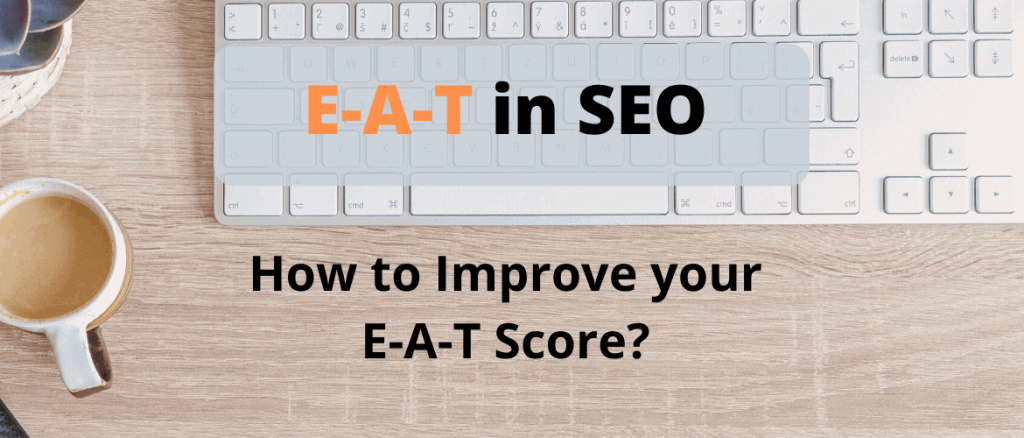21 Oct

What is E-A-T and Why is it Important for SEO
E-A-T has become one of the most talked-about SEO concepts today. While it has been part of Google’s guidelines since at least 2014, the search engine giant has been emphasizing it a lot more. So let’s find out what exactly is E-A-T, how it can impact search results, and how you can use it to create content that ranks above your competitors.
What is E-A-T?
E-A-T stands for Expertise, Authority and Trust. These are the three principles that Google uses to assess each piece of content that it crawls.
Domains and businesses with the best display of their Expertise, Authority and Trust should not only see themselves promoted by Google, but this should also associate and result with improved trust and purchases by a business’ target audience.
E-A-T makes it easy for entrepreneurs and business owners, who are looking to put up their websites, to know what Google needs out of their sites.
How is E-A-T evaluated?
Expertise, authoritativeness, and trustworthiness are similar concepts but not identical. So, they’re each evaluated independently using a different set of criteria.

Expertise
Expertise means to have a high level of knowledge or skill in a particular field. It’s evaluated primarily at the content-level, not at the website or organizational level. Google is looking for content created by a subject matter expert.
If you provide a service or sell a product that you have deep knowledge about, you may be classified as an expert. Genuine expertise cannot be faked, especially when you’re a certified professional or are regularly cited by third-parties as an expert.
Authority
Authority is about reputation, particularly among other experts and influencers in the industry. The author should be a well-known person on the topic or in their industry. For Google’s Quality Raters, this doesn’t mean that how many Twitter followers author have. It could mean that the author or publication has won awards in their industry that makes them an authority on the subject.
Trust
There should be proof that we can trust the content on the website. Quality Raters examine trustworthiness by looking at the website as a whole. They focus on finding privacy policies, editorial policies, and security updates.
Google now measures trust in a website based upon the backlinks it detects from other domains. The higher the trust in the linked from domain, the more trust it puts into the linked to domain.
Google’s Quality Raters use that acronym to confirm that Google is ranking high-quality websites above lower-quality, less trustworthy websites.
Google’s principles for high E-A-T
One of the best things about Google’s Search Quality Rating Guidelines is that they give specific examples of websites with high E-A-T, and they explain why those sites have high E-A-T. We can use those examples to reverse-engineer E-A-T.
The websites that Google ranks as having high E-A-T can be categorized into three categories:
- High reputation – the publication is well-known.
- Good user experience – the publication helps users do what they need to do.
- Self-reference – the website is about itself.
Google’s examples of low E-A-T
On the flip side, Google’s guidelines also give examples of pages with low E-A-T. There are a number of reasons pages could have low E-A-T, but they primarily fall into these three categories:
- Unprofessional – The main content is written poorly and full of typos.
- No expertise – There’s no proof that the author has experience on what he or she is writing.
- Demonstrably inaccurate – There is clear evidence that the content is inaccurate.
Why E-A-T is so important?
E-A-T is extremely important for Google. When they find a page or domain that lacks, Expertise, Authority or Trust they will look for alternative options.
Google is training the algorithm to look at these measurements and using them as signals to determine whether they should entrust a business’s domain or web pages to satisfy their user’s needs. If we fail to satisfy those needs, Google will choose someone else to do so instead.
In simple words, when Google finds out another page or domain with better E-A-T it will promote that page instead of your page or domain that means you will lose your ranking, traffic and revenue too.
Therefore to maintain your Google ranking and your traffic that affects your income E-A-T is important.
How to improve E-A-T?

E-A-T takes number of steps aimed at increasing the quality of what you publish and your website as a whole. These steps are all about doing what you can to make your website as helpful as possible.
1. Optimize your About and Author pages
These two pages are extremely important for E-A-T. They help Google understand your expertise and authority.
Those pages should explain why your company is an expert and authority in your industry and why the authors writing content are experts. Make sure you list any industry awards and tributes that you’ve won. You’ll also want to link to relevant social media channels for both your company and the authors who write for you.
2. Make Your ‘contact us’ options very obvious
This one falls under the trustworthiness part of E-A-T. Throughout the Quality Rating Guidelines, Google mentions that it should be easy to contact the company whose website you’re on. In Google’s eyes, if your website isn’t allowing visitors to contact you, you’re probably hiding something.
It’s all about keeping it transparent. If you want your customers to call you add a phone number on your website’s header and footer. Use a live chat plug-in to let visitors chat with you. Have a dedicated “Contact Us” page. Even if your website is just a blog, and nothing else, provide readers with an email address of how they can get in touch with you.
Whatever option you choose just make sure to make it easily visible and accessible for people to get in touch with you.
3. Create a Privacy Policy
This can also be categorized under the trustworthiness part of E-A-T. Every website on the internet should have a privacy policy. If you accept credit card information for payments, use analytics tools (like Google Analytics), or use remarketing tools, you need a privacy policy.
Privacy policies tell users how you plan to collect and use their data. Google wants to see the privacy policy on a website because it helps build trust that you aren’t doing anything nefarious with the data you’re collecting.
Your privacy policy should be linked in the footer of every page on your website.
4. Create Editorial Guidelines
When you write and publish content on your website, you should consider creating editorial guidelines. This step is specifically called out in Google’s Search Quality Rating Guidelines. Editorial guidelines will help improve your trustworthiness by proving that you have a well-defined process for creating and editing content.
Google cites the editorial guidelines from BBC News and USA Today as important pages on websites that publish content.
5. Increase positive reviews
Positive reviews on third-party websites are a signal to Google that you’re a trusted authority in your industry.
Quality Raters are instructed to look at a company’s reviews on Google, and the Better Business Bureau when evaluating the E-A-T of a specific website. It’s reasonable to assume that if QRs are supposed to look at those websites, Google’s algorithm is taking those platforms into account too.
6. Invest in security
Security is a big deal for Google. In 2015, they stated that secure websites would be ranked higher than non-secure sites because in Google’s view, secure sites are more trustworthy.
At the very least, you’ll want to make sure your website has its SSL certificate. You should also look into security standards for your industry. Your goal with this step should be to create the most trustworthy website possible. As both Google and your website visitors will reward you for it.
7. Consider Your Authors
With expertise and authority being two-thirds of E-A-T, it’s safe to assume that you should take the authors of your content seriously. If your interns are writing all blog content, Google likely won’t view them as experts. The experts in your company are the people on your leadership team, or people who have worked in the industry for some time.
If you’re having a hard time getting those people to write blog content for you, consider using a ghostwriter. As long as the ghostwriter you’re using has a track record of creating high-quality content.
8. Remove low E-A-T Content
Even a few of low-quality pieces of content can drag your whole website down. If your company has been writing and publishing content for years, there’s a chance that a few low-quality pieces have gotten published.
Hence, take some time to find your low-quality pages and get rid of them. You can do this by editing those pages to improve them, or deleting the problem pages altogether.
Final Thoughts
E‑A-T is important for SEO, and it’s something that you should work to improve. It sounds simple, and it is; it just requires some time and effort. E-A-T is something that Google takes very serious.
Now it is the time for you to take E-A-T seriously as well. Creating high E-A-T for your website won’t happen overnight, but if you build a strategy around the steps we outlined above, you’ll have a good chance of improving your E-A-T.
